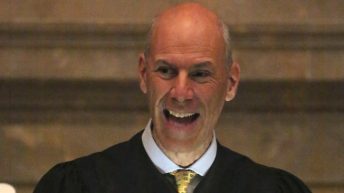The Department of Homeland Security has sued California to block a state law that would force federal immigration agents to reveal their identities, arguing the measure is unconstitutional and endangers officers; the clash centers on federal authority, rising threats to agents, and California Democrats’ push for the No Secret Police Act, SB 627.
First Assistant U.S. Attorney Bill Essayli announced that the Department of Homeland Security filed suit to stop California’s law that would require Immigration and Customs Enforcement agents to unmask. He framed the move as necessary to protect federal officers from being exposed and targeted by criminals and hostile actors. The lawsuit underscores a basic federalism point: states cannot regulate the operations of federal law enforcement where federal interests and personnel are involved.
Essayli posted on X that DHS had “filed a lawsuit to strike down California’s unconstitutional law aimed at unmasking the faces of our federal agents, which will allow criminals to dox them.” That post reflects a clear, immediate concern about the safety and operational security of agents conducting lawful work. The administration sees the law not as a transparency measure but as a direct risk that could lead to doxxing and violence against federal personnel.
Essayli added that “Assaults against federal agents have exploded over the last few months, thanks in part to [reckless] political rhetoric aiming to delegitimize our brave agents.” He warned that “Unconstitutional laws such as this one further endanger our brave men and women protecting our community.” His language is sharp because DHS and the Justice Department view the statute as an overreach that interferes with federal enforcement priorities and with agents’ ability to work safely.
The California law known as the No Secret Police Act, SB 627, was introduced by State Senator Scott Wiener and later signed by Governor Gavin Newsom. It would broadly prohibit law enforcement from covering their faces while interacting with the public, with limited exceptions, and would extend those rules to federal officers operating in the state. From a federal perspective, that kind of state regulation of federal actors is on shaky legal ground and invites immediate constitutional challenge.
Existing law makes it a misdemeanor to wear a mask, false whiskers, or any personal disguise, as specified, with the purpose of evading or escaping discovery, recognition, or identification while committing a public offense, or for concealment, flight, evasion, or escape from arrest or conviction for any public offense.
This bill would make it a crime for a law enforcement officer to wear a facial covering in the performance of their duties, except as specified. The bill would define law enforcement officer as anyone designated by California law as a peace officer who is employed by a city, county, or other local agency, and any officer or agent of a federal law enforcement agency or law enforcement agency of another state, or any person acting on behalf of a federal law enforcement agency or agency of another state. The bill would make a violation of these provisions punishable as an infraction or a misdemeanor, as specified. By creating a new crime, this bill would impose a state-mandated local program.
Supporters say the bill will increase trust and accountability by preventing anonymous police behavior, but critics point out it sweeps in federal personnel and could cripple undercover operations and protective measures. Federal agents often depend on anonymity to conduct investigations, gather evidence, and shield themselves from retaliation. Forcing identities into the open would hamper those operations and expose individuals to security risks that are neither theoretical nor hypothetical.
Wiener argued there was a rise of secret police and claimed masks and unmarked operations were eroding trust. His social media post said, “We’re announcing new legislation — the No Secret Police Act (SB 627) — to ban local/state/federal law enforcement, w/ some exceptions, from covering their faces when interacting w/ the public & require them to wear identifying info,” and added that “Secret police behavior tanks trust & must end.” That rhetoric paints federal enforcement as part of a broader problem, but it also downplays the real safety and legal complications of stripping protections from federal operatives.
The Justice Department previously warned that states cannot dictate how federal agencies do their jobs, and Assistant Attorney General Harmeet Dhillon pushed back publicly when the bill was introduced. The federal legal stance is straightforward: where federal functions and personnel are concerned, state laws that interfere with federal duties are likely preempted. That principle is central to the lawsuit and will be a core issue when the courts weigh the case.
Beyond doctrine, the practical stakes are high: DHS and ICE say threats and assaults against agents are increasing, and they argue the law would make those threats worse by revealing identities. Defenders of federal authority insist that protecting officers is not about secrecy for its own sake but about preserving their ability to enforce immigration laws and keep communities safe. The case will test how far a state can go in regulating behavior that intersects with federal missions and national security interests.
The litigation promises to be contested and consequential, touching on separation of powers, operational security, and political theater. California’s lawmakers crafted SB 627 as a statement on policing and accountability, while DHS framed its suit as a necessary defense of federal prerogatives and officer safety. As the courts consider the arguments, the clash will be watched closely by both law enforcement and policymakers across the country.





Mʏ ʟᴀsᴛ ᴘᴀʏ ᴄʜᴇᴄᴋ ᴡᴀs 8500 ʙᴜᴄᴋs ᴡᴏʀᴋɪɴɢ 10 ʜᴏᴜʀs ᴀ ᴡᴇᴇᴋ ᴏɴʟɪɴᴇ. My younger brother friend has been averaging 11k ʙᴜᴄᴋs for months now and he works about 22 hours a week. I cant believe how easy it was once I tried it out…….
Tʜɪs ɪs ᴡʜᴀt I ᴅᴏ__________ EarnApp1.Com